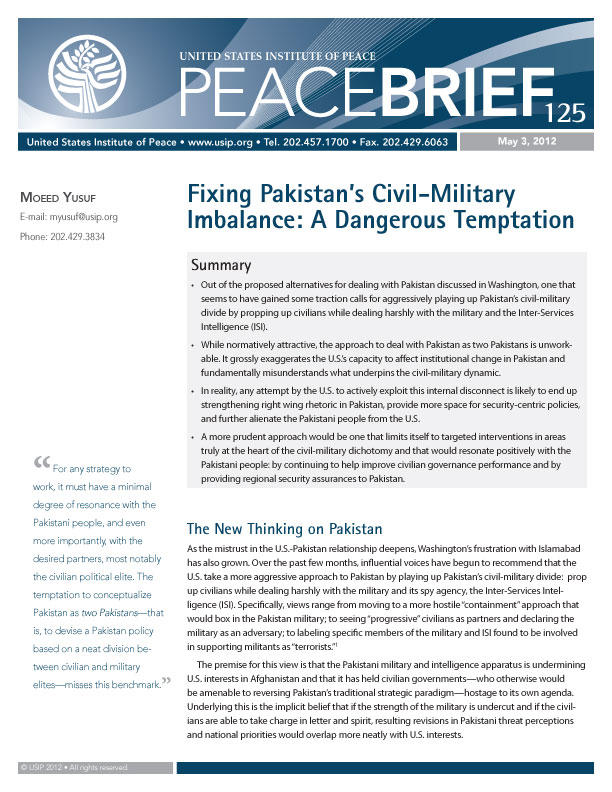Fixing Pakistan’s Civil-Military Imbalance: A Dangerous Temptation
This report focuses on one of the central debates on Pakistan in Washington: how to deal with this troubled and troubling ally in the months and years ahead. While views are divided, the rising frustrations with Pakistan have led many to lose patience and seek a stern response from the U.S. The author, USIP’s South Asia adviser, addresses a misconception regarding Pakistan’s civil-military relationship and the potential for the U.S. to make this the basis of engagement with Pakistan.

Summary
- Out of the proposed alternatives for dealing with Pakistan discussed in Washington, one that seems to have gained some traction calls for aggressively playing up Pakistan’s civil-military divide by propping up civilians while dealing harshly with the military and the Inter-Services Intelligence (ISI).
- While normatively attractive, the approach to deal with Pakistan as two Pakistans is unworkable. It grossly exaggerates the U.S.’s capacity to affect institutional change in Pakistan and fundamentally misunderstands what underpins the civil-military dynamic.
- In reality, any attempt by the U.S. to actively exploit this internal disconnect is likely to end up strengthening right wing rhetoric in Pakistan, provide more space for security-centric policies, and further alienate the Pakistani people from the U.S.
- A more prudent approach would be one that limits itself to targeted interventions in areas truly at the heart of the civil-military dichotomy and that would resonate positively with the Pakistani people: by continuing to help improve civilian governance performance and by providing regional security assurances to Pakistan.
About This Brief
This report focuses on one of the central debates on Pakistan in Washington: how to deal with this troubled and troubling ally in the months and years ahead. While views are divided, the rising frustrations with Pakistan have led many to lose patience and seek a stern response from the U.S. The author, USIP’s South Asia adviser, addresses a misconception regarding Pakistan’s civil-military relationship and the potential for the U.S. to make this the basis of engagement with Pakistan.
The views expressed in the report are based on the author’s own research on the subject and multiple conversations with relevant Pakistani interlocutors; they do not represent the views of USIP, which does not take positions on policy issues. This report advances USIP’s goal of generating a better understanding of Pakistani institutional and conflict dynamics and of the U.S.-Pakistan relationship.



